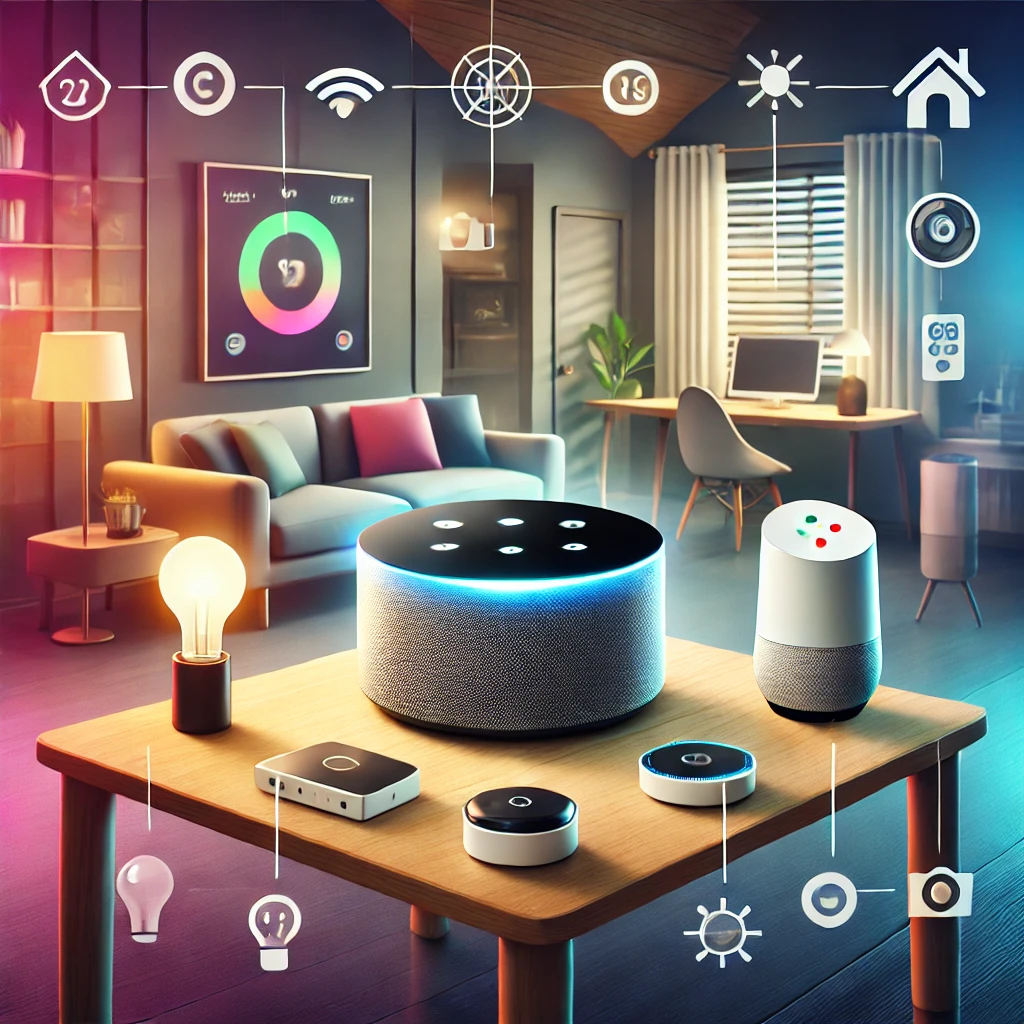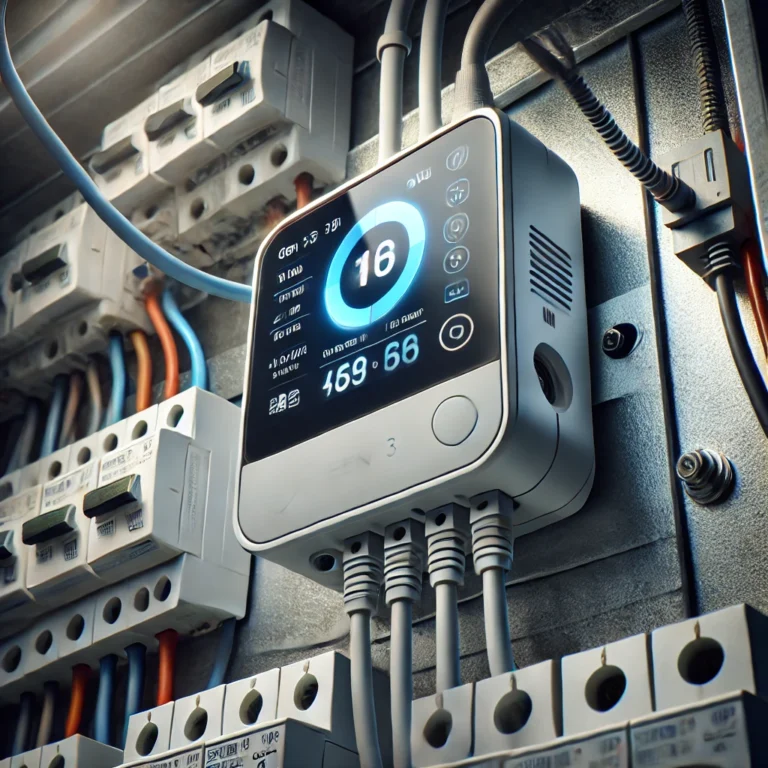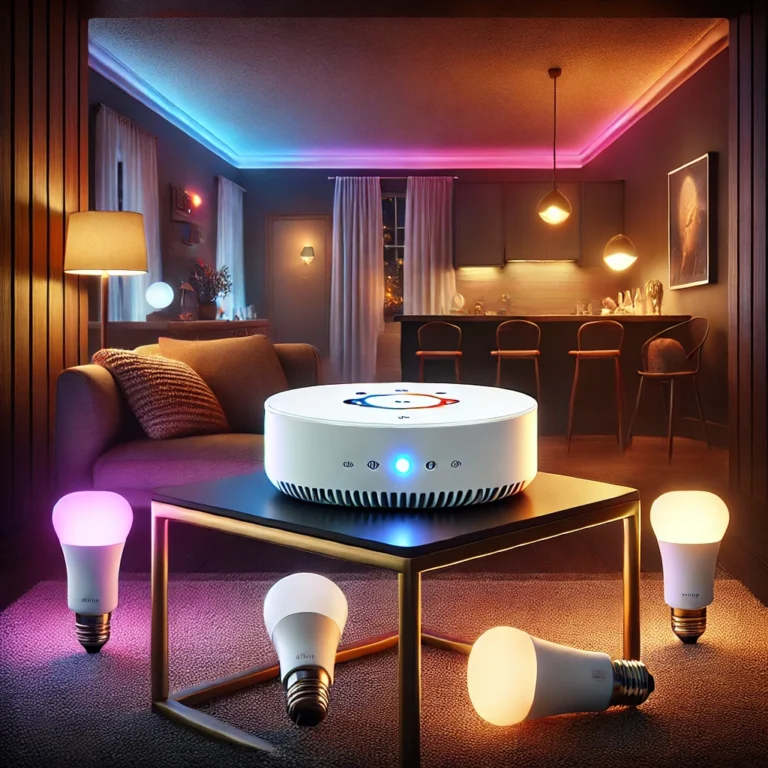Best Home Automation Hub for Beginners in 2024
As smart homes become more accessible, many people are looking to dive into home automation for the first time.
For beginners, the key is to start with a home automation hub that is simple, intuitive, and easy to set up. The right hub will allow you to manage all your smart devices effortlessly and provide a solid foundation for expanding your smart home system in the future.
We decided to write this post as we wrote a guide on picking a home automation hub generally, however what happens if you are complete beginner and looking for something easy to setup and use?
Or maybe, you want to try out the technology but you are brand-new to using it?
If this is the case then this post will help you.
Click here to view the best hubs…

What to Look for in a Simple Hub?
When choosing a home automation hub as a beginner, it’s crucial to focus on simplicity, compatibility, and ease of use. Here are the key factors to consider:
Ease of Setup:
Plug-and-Play Functionality: Look for hubs that offer straightforward, plug-and-play setup processes. You should be able to get your hub up and running without needing technical expertise or spending hours troubleshooting.
Clear Instructions: A hub with clear, concise instructions and a user-friendly app can make the setup process much more manageable.
User-Friendly Interface:
Intuitive App Control: The hub’s app should have an easy-to-navigate interface that allows you to control and automate your devices with minimal effort. Look for features like drag-and-drop interfaces or preset automation options that simplify the process.
Voice Control Compatibility: Many beginners find it helpful to use voice assistants like Alexa, Google Assistant, or Siri to control their smart devices. Ensure the hub is compatible with your preferred voice assistant.
Device Compatibility:
Basic Device Support: For beginners, it’s essential to choose a hub that supports the most commonly used smart devices, such as lights, thermostats, and smart plugs. This will allow you to start small and add more devices as you become more comfortable.
Wi-Fi Compatibility: Hubs that support Wi-Fi devices are typically easier for beginners since most smart home gadgets operate over Wi-Fi. This removes the need to understand more complex protocols like Zigbee or Z-Wave initially.
Affordability:
Budget-Friendly Options: As a beginner, you might not want to invest heavily in a hub right away. Look for affordable options that provide good value without unnecessary complexity or advanced features you won’t use yet.
Reliable Performance:
Stable Connectivity: The hub should offer stable and reliable connectivity with your smart devices to prevent frustration from frequent disconnections or delays.
If you make sure that you cover the above you should be absolutely fine with the home automation hub that you pick. You can also check out our top reviews for the best home automation hubs on this site.
Best Choices for a Beginner in 2024
Here are some of the top home automation hubs for beginners in 2024, each offering a blend of simplicity, affordability, and expandability:
Why It’s Great for Beginners: The Echo Dot is not only an affordable entry point into smart home automation but also incredibly easy to set up. As a hub, it works seamlessly with Alexa-compatible devices, allowing you to control lights, plugs, thermostats, and more using voice commands.
Key Features: Simple voice control, Wi-Fi compatibility, user-friendly app, and affordable pricing make it a favorite among newcomers.
Pros: Easy to use, great for Amazon ecosystem users, and no need for a separate hub device.
Cons: Limited to Alexa-compatible devices and mostly Wi-Fi devices.
Why It’s Great for Beginners: The Google Nest Hub offers a straightforward setup process and a user-friendly interface, making it ideal for those who are already invested in Google’s ecosystem. It supports a range of smart devices that work over Wi-Fi, and its visual display provides helpful guidance and control.
Key Features: Voice control with Google Assistant, visual interface, easy integration with Google services, and good compatibility with many popular smart devices.
Pros: Great for Google ecosystem users, intuitive touchscreen interface, and helpful smart home control features.
Cons: Limited to Google Assistant-compatible devices and mainly supports Wi-Fi devices.
Why It’s Great for Beginners: Samsung’s SmartThings Station is designed for simplicity and ease of use, making it a fantastic option for beginners. It supports a wide range of devices across different protocols (Wi-Fi, Zigbee, and Bluetooth), which offers flexibility for future expansions.
Key Features: Broad device compatibility, user-friendly app, integration with SmartThings ecosystem, and straightforward setup process.
Pros: Flexible compatibility, easy to use, and supports multiple protocols, offering room for future expansion.
Cons: May have more features than necessary for complete beginners, slightly higher price point.
Apple HomePod Mini with HomeKit:
Why It’s Great for Beginners: For those already in the Apple ecosystem, the HomePod Mini offers an easy entry point into home automation. It works seamlessly with Siri and supports a range of HomeKit-compatible devices, allowing you to control your home with voice commands or through the Home app on your iPhone.
Key Features: Voice control with Siri, tight integration with Apple devices, strong privacy and security features, and support for HomeKit-compatible devices.
Pros: Perfect for Apple users, easy to set up, and secure.
Cons: Limited to HomeKit-compatible devices, and Apple’s ecosystem can be more restrictive.
Expanding in the Future
As you become more comfortable with your smart home setup, you may want to expand your system to include more devices and more complex automations. Here are some tips for planning future expansions:
Choose a Hub with Scalability:
Multi-Protocol Support: If you anticipate growing your smart home, consider starting with a hub that supports multiple communication protocols like Zigbee and Z-Wave, such as the Samsung SmartThings Station. This will provide greater flexibility as you add more devices.
Expandable Ecosystem: Opt for hubs from brands that are known for their broad compatibility and frequent updates, ensuring your hub can support new devices and features as they become available.
Gradual Expansion:
Start Small: Begin with essential devices like smart lights, plugs, or thermostats, and gradually add more as you get more comfortable with your hub and automation setup.
Learn as You Go: Take your time to learn about each device’s features and how they can work together. This approach will help you understand your needs better and make more informed decisions about future purchases.
Consider Advanced Automation Features:
Explore Automation Scenarios: As you expand, experiment with creating automation scenarios or routines that integrate multiple devices. For instance, set up a “Good Night” routine that locks the doors, turns off lights, and sets the thermostat.
Invest in Sensors and Cameras: For added security and functionality, consider adding smart sensors (like motion detectors or contact sensors) and cameras that can trigger specific automations based on events.
Conclusion
For beginners venturing into home automation in 2024, choosing the right hub can make all the difference in creating a smooth and enjoyable experience. Focus on simplicity, ease of use, and compatibility with the devices you already own or plan to buy. The Amazon Echo Dot with Alexa, Google Nest Hub, Samsung SmartThings Station, and Apple HomePod Mini are all excellent options that offer varying levels of complexity and compatibility, catering to different needs and preferences.
Starting with a user-friendly hub will set you up for success and provide a solid foundation for future expansion as you become more comfortable and confident in managing your smart home. Remember, the key is to start simple, learn as you go, and expand at your own pace. With the right hub and a bit of curiosity, you’ll be able to build a smart home that enhances your comfort, convenience, and security.
Be sure to check out our reviews of the top home automation hubs here on the site.

